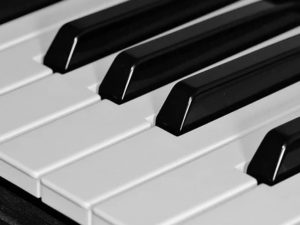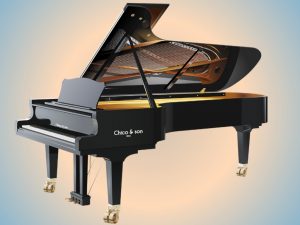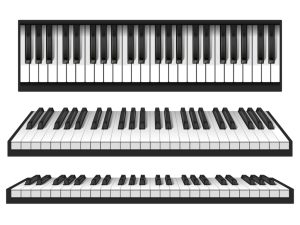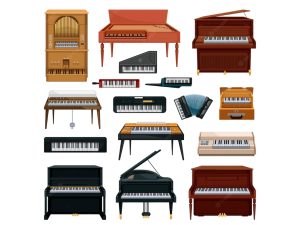How Long Does it Take to Learn the Piano?: When it pertains to learning any musical instrument, this is a typical question. Certainly, you purchased a piano, hired a teacher, and perhaps downloaded an app like Flow key or Simply Piano. But what’s the duration it’ll take for you to be able to confidently state, “Yes, I can play the piano“. You’ve taken the first step, but where do you go from here?
Alas, the true response is “it depends.” Your piano learning journey has no end; you will continue to learn as long as you play. Even the most accomplished concert pianists are continuously learning. However, this process of learning is frequently faster for children than for adults, for the same reason that children learn languages more easily: their brains are more adaptable. That isn’t to imply that grownups can’t achieve a reasonable degree of skill in their chosen field; you just need to be a little more patient.

However, here’s an approximate estimate of how high your level will be after a given period. The figures are for an adult learner who has never played the piano or any other musical instrument before.
Recommended: Best side hustles for students who are still in school
Estimated time for Beginner Level
Answer: One year
After about a year, you should be at the beginner level. This corresponds to the Associated Board of the Royal Schools of Music’s Grade 1 or 2 levels (ABRSM). Expect to perform simple compositions and have a good understanding of reading sheet music, playing basic one-octave scales, and so on.
Estimated time for Intermediate Level
Answer: Three to four years
After three to four years, you should be able to attain this level. You should be able to play at a Grade 4 or 5 level (ABRSM). At this point, students should be able to sightread, follow increasingly complicated rhythmic progressions, and scale across most keys up to 2 – 3 octaves. Furthermore, at this stage, a student is inclined to learn pieces without the assistance of a teacher, but would still rely on the instructor to provide most of the instruction.
Also see: How long does it take to learn Python programming from start to finish
Estimated time for Advance level
It will take at least five years and up to ten years to attain this level. You should be able to play at the Grade 8 (ABRSM) level or above by this point. You should be able to sightread works 3 or 4 grades below your level of play with ease. In every key, you should be able to play scales, arpeggios, broken chords, and so on. Also, at this point, you should feel quite comfortable selecting your repertoire and learning works on your own.
Recommended: Hardest musical Instruments To Play and Learn
How long does learning the piano take (for adults)?
This is, once again, a difficult question to measure. It depends on a variety of things, including how swiftly you learn, your musical background, and how much time is given to practice. If you can play the violin to a Grade 8 level, for example, you may be able to master the piano fast, to an extent where it may only take about two years for you to reach the same level with your piano playing. If you’re a complete novice, you’ll need to play for a minimum of five years to reach the same level.

The duration of your training is also determined by the type of teaching you get. You will learn rapidly if you train with a good, experienced teacher who can immediately detect and correct your faults while also suggesting a repertoire that you are enthusiastic about which may assist in your practice. If you have a teacher who isn’t as interested in your personal growth as you are, or who isn’t particularly experienced in teaching complete novices, your progress could be considerably slower
The most valuable tip is to identify the teaching approach that works best for you. An effective teacher who acknowledges the frequent problems that new students face is great. However, many teachers will claim to have taught beginners when, in reality, they have not and would be better suited to training higher-level students.
If you can’t afford a piano instructor or don’t have the time to attend one, you might use a piano learning app or attempt teaching yourself. You can use a piano learning app to assist you, but keep in mind that your development will be slower than if you went to a professional teacher. Not everyone can pay or schedule this, so if you can’t see a teacher, don’t give up hope; just be aware that it will take longer.
Recommended: How to become a successful business entrepreneur
How many hours a day should you practice the piano?
The answer is “it depends,” as is true with so much in the piano-learning world. Ideally, you should practice for:
As much time as you have to devote to the piano
As much time as you can sit at the piano and stay focused.
Allow me to expand on this. According to logic, if you practice for an hour every day, you will progress at thrice the rate of someone who trains for only twenty minutes each day. Nonetheless, this isn’t always the case. It is more essential to focus on the quality of your practice than the quantity. It doesn’t matter how many hours you spend at the piano if you just practice by going through your compositions and repeating the same mistakes over and over again. You are not going to get better.

You will improve fairly rapidly if you take a conscientious, intentional approach to learn the piano. You can make headway even if you just devote twenty minutes each day, provided those twenty minutes are intensely utilized. Nevertheless, in a perfect scenario, you’ll perform as much hyper-focused practice as you can daily. Assuming your practice is solid, training two hours a day will certainly help you progress faster than practising twenty minutes.
Also see: Most difficult programming languages to learn in 2022
Can I teach myself piano?
The answer is a resounding yes. Several people, notably those who are young and have a strong interest in music, can pick out melodies on the piano with remarkable ease although without understanding basic music theory.
You may utilize applications like Flow key and Simply Piano, as well as YouTube tutorials, to assist you in learning. This will not affect you at all. A teacher, on the other hand, can highlight or explain things that will enable you to learn faster. If you have an instructor to assist you, it will be a lot more reliable. You will ultimately become stuck on something you can’t seem to figure out if you don’t have an instructor, with no one to assist you. This is true for all players, not just beginners and intermediates. Almost everyone can relate to this.
Recommended: Arts or Science, Which is More Important? (Debate)
Is it hard to learn the piano?
For those without a musical background, learning any musical instrument is difficult. However, instead of focusing on the possible difficulties, reflect the possible benefit. No one should be disheartened if learning takes longer than expected. The adventure is the most enjoyable part of the journey. Learning to play music is a lifetime endeavour. Nobody is ever too old to learn. Learning to play the piano is a never-ending process.

Yes, it is difficult. It necessitates a great deal of commitment. You’ll want to stop playing and give up. You will become weary of practising. You will not want to practice when you get home from work or school. I would advise you to ignore this and stick to your plan. You’ll be pleased you took the initiative.
Recommended: Advantages and Disadvantages of Electronic Banking
How to Learn And Master The Piano Within The Shortest Time
1. Getting started with piano: Getting started with the piano is an important first step in learning and mastering the instrument. You’ll need to invest in a good-quality keyboard or acoustic piano and make sure it’s set up correctly for your posture and hand positioning. Proper posture and hand positioning are essential to playing efficiently and avoiding injury. It’s also important to learn the basics of music theory, such as reading sheet music, understanding note values, and identifying basic chords.

This foundation will allow you to play simple songs and begin to develop your skills. As a beginner, it’s crucial to start with easy pieces and gradually work your way up to more challenging music. You should also set specific goals and create a practice schedule to help you stay motivated and make progress. With dedication and regular practice, you can become a skilled pianist and enjoy playing beautiful music for years to come.
2. Learning basic music theory: Learning basic music theory is a crucial step in mastering the keyboard. By understanding the fundamental principles of music, such as scales, chords, and rhythm, you can better comprehend how music is structured and create your compositions.
With a solid foundation in music theory, you can read sheet music and play more complex pieces with ease. It can also help you improvise and compose your music, giving you the creative freedom to express yourself musically.
Understanding the keyboard’s layout, recognizing the notes on the staff, and learning the fundamental chord progressions are some crucial topics to concentrate on when learning music theory for the keyboard. You may develop your keyboard skills quickly and become a more certain and skilled musician with constant practice and a willingness to learn.

Recommended: Highest Paying Jobs In The World
3. Practice effectively: The secret to learning and mastering the keyboard is to practice effectively. To do this, start by establishing specific objectives and breaking them down into manageable tasks. Practice frequently, preferably at the same time every day, and concentrate on your weakest areas. Take breaks to stay focused and avoid getting tired.
To increase precision and speed, use purposeful practice strategies like repetition and feedback. To make studying exciting and challenging, seek out resources and advice from experts and play around with different musical genres. To become proficient, keep in mind that focused practice over time is the key.
4. Improving your finger dexterity and speed: Improving your finger dexterity and speed is crucial to mastering the piano. Regular practice exercises like scales, arpeggios and Hanon exercises can help improve finger independence and speed.
Incorporating finger-strengthening tools like grip strengtheners can also be useful. Additionally, proper hand positioning and posture are essential to prevent injuries and facilitate optimal playing technique. Consistent practice and gradually increasing speed and difficulty can further enhance finger dexterity and speed. Overall, regular practice and attention to proper technique can significantly improve finger dexterity and speed and facilitate piano mastery

Edeh Samuel Chukwuemeka, ACMC, is a lawyer and a certified mediator/conciliator in Nigeria. He is also a developer with knowledge in various programming languages. Samuel is determined to leverage his skills in technology, SEO, and legal practice to revolutionize the legal profession worldwide by creating web and mobile applications that simplify legal research. Sam is also passionate about educating and providing valuable information to people.